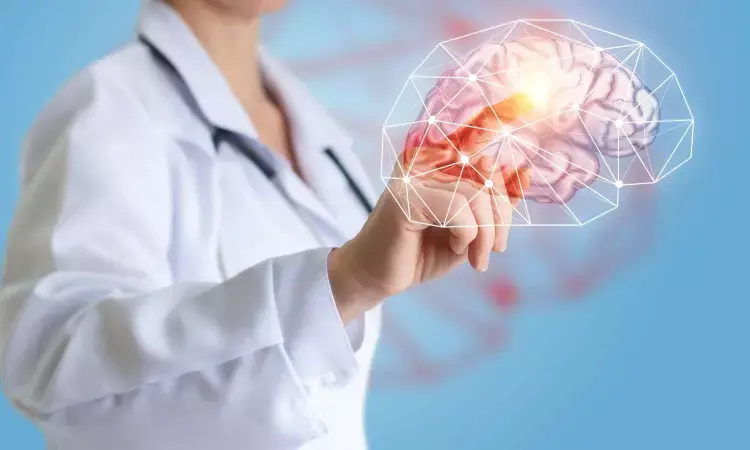- Home
- Medical news & Guidelines
- Anesthesiology
- Cardiology and CTVS
- Critical Care
- Dentistry
- Dermatology
- Diabetes and Endocrinology
- ENT
- Gastroenterology
- Medicine
- Nephrology
- Neurology
- Obstretics-Gynaecology
- Oncology
- Ophthalmology
- Orthopaedics
- Pediatrics-Neonatology
- Psychiatry
- Pulmonology
- Radiology
- Surgery
- Urology
- Laboratory Medicine
- Diet
- Nursing
- Paramedical
- Physiotherapy
- Health news
- Fact Check
- Bone Health Fact Check
- Brain Health Fact Check
- Cancer Related Fact Check
- Child Care Fact Check
- Dental and oral health fact check
- Diabetes and metabolic health fact check
- Diet and Nutrition Fact Check
- Eye and ENT Care Fact Check
- Fitness fact check
- Gut health fact check
- Heart health fact check
- Kidney health fact check
- Medical education fact check
- Men's health fact check
- Respiratory fact check
- Skin and hair care fact check
- Vaccine and Immunization fact check
- Women's health fact check
- AYUSH
- State News
- Andaman and Nicobar Islands
- Andhra Pradesh
- Arunachal Pradesh
- Assam
- Bihar
- Chandigarh
- Chattisgarh
- Dadra and Nagar Haveli
- Daman and Diu
- Delhi
- Goa
- Gujarat
- Haryana
- Himachal Pradesh
- Jammu & Kashmir
- Jharkhand
- Karnataka
- Kerala
- Ladakh
- Lakshadweep
- Madhya Pradesh
- Maharashtra
- Manipur
- Meghalaya
- Mizoram
- Nagaland
- Odisha
- Puducherry
- Punjab
- Rajasthan
- Sikkim
- Tamil Nadu
- Telangana
- Tripura
- Uttar Pradesh
- Uttrakhand
- West Bengal
- Medical Education
- Industry
AF patients treated with catheter ablation have reduced risk of dementia compared to those on medication alone

Atrial fibrillation is a common heart rhythm disorder which can be cured by catheter ablation that uses radiofrequency through a tube into the heart to destroy small areas of heart tissue that may be causing the abnormal heartbeat.
Researchers have found in a new research that People with atrial fibrillation that is treated by catheter ablation may have a reduced risk of dementia compared to those who are treated with medication alone.
The preliminary study released was presented on April 18, 2023 at the American Academy of Neurology’s 75th Annual Meeting being held in person in Boston and live online from April 22-27, 2023.
“Previous studies have found that people with arrythmias may have long-term thinking and memory problems due to how this condition may affect the blood flow to the brain,” said Bahadar Srichawla, DO, of University of Massachusetts Chan Medical School in Worcester and a member of the American Academy of Neurology. “Our findings show that treatment with catheter ablation is linked to a reduced risk of cognitive impairment.”
The study involved 887 people with an average age of 75 at the start of the study. Of this group, 193 people received catheter ablation.
Participants completed a memory and thinking test at the start of the study, at one year and at two years. This test included questions regarding short-term memory, attention, concentration and language. Scores ranged from zero to 30. Cognitive impairment was defined as a score of 23 or less. People who received catheter ablation had an average score of 25 compared to people who did not receive the procedure with an average score of 23.
After adjusting for factors like heart disease, renal disease, sleep apnea and atrial fibrillation risk score, those who underwent catheter ablation were 36% less likely to develop cognitive impairment than those who did not receive the procedure and were treated only with medication.
“Our results are encouraging, however there are many factors taken into consideration when catheter ablation is prescribed,” Srichawla added. “More research is needed to confirm our results.”
A limitation of the study was that no tests of blood flow to the brain were recorded.
Reference:
Could fixing a problem with the heart be good for your brain?, American Academy of Neurology, Meeting, American Academy of Neurology Annual Meeting.
Dr Kamal Kant Kohli-MBBS, DTCD- a chest specialist with more than 30 years of practice and a flair for writing clinical articles, Dr Kamal Kant Kohli joined Medical Dialogues as a Chief Editor of Medical News. Besides writing articles, as an editor, he proofreads and verifies all the medical content published on Medical Dialogues including those coming from journals, studies,medical conferences,guidelines etc. Email: drkohli@medicaldialogues.in. Contact no. 011-43720751


